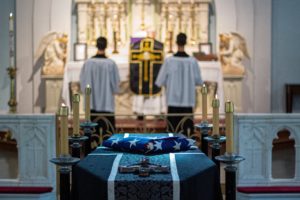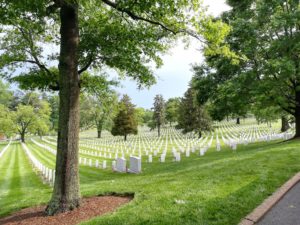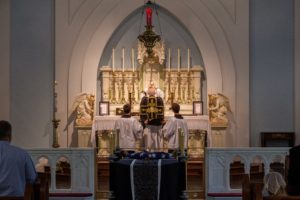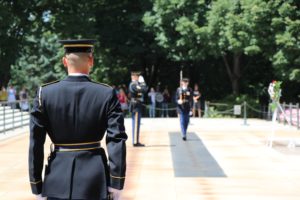A Prayer for the Unknown Soldier
by Rachel Shrader
A blessed and peaceful Memorial Day to all. Although today evokes thoughts of barbecues, get-togethers with family and friends, and the unofficial beginning of summer, much of what we would normally have planned for today may have been curtailed by recent events and the accompanying closures. But perhaps such restrictions give us a chance to pause and reflect on what this day is really about, and the relative isolation we may have to endure may be a fitting reminder of those who are no longer with us, and whose absence will remain even when the lockdowns are lifted.

Memorial Day is, of course, a tribute to those who have given their lives in the service of our country. Though different wars happen for different reasons in different eras with varying levels of popular support, what is common to them all is that many went, many returned, and some did not. All who went raised their right hand and swore an oath to support and defend the Constitution, with the implicit obligation to give their lives in its defense if necessary, and some fulfilled their oath to the letter. Some military children have rejoiced at their parents’ return from war; some have wept. Some parents have greeted their returning sons and daughters with laughter and “Welcome Home” signs; others have greeted flag-draped coffins with a sorrow that, unless experienced, is hard to comprehend. For some, remembering those who have made the ultimate sacrifice is something they do every hour of every day.

A couple years ago I visited Arlington National Cemetery with a friend. We both have relatives buried there. It was a drizzly day, the dreary weather and the thousands of identical gravestones cast across the green hills a somber reminder of the sacrifices of so many. We stopped at one of the most famous graves in the cemetery, the Tomb of the Unknown Soldier, a monument to those unidentified dead and missing of the World Wars, Korea, Vietnam, and by extension all conflicts in which the U.S. has been involved. The U.S. Army’s 3rd Infantry Regiment maintains a constant presence there, guarding the Tomb day and night, every day of the year, and we watched the impressive changing of the guard that occurs every 30 or 60 minutes depending on the time of year. It is fascinating to me that the most carefully guarded and iconic of all graves in Arlington belongs to those who do not have so much as an identity, who are, in a sense, the least among the thousands of their brethren buried there, the least loved, the least known.

But in God’s view, not one is forgotten. Not even a sparrow falls to the ground without His knowledge (Matthew 10:29), and He knows the names of all the unknowns who lay buried in Arlington, in the fields of France, in the depths of the sea, or elsewhere in unmarked graves. He is a God well-acquainted with both obscurity and sacrifice, Who chose to live in obscurity most of His earthly life and allowed Himself to be counted with the transgressors in His death. He is the God Who told us that “greater love has no man than this, that a man lay down his life for his friends” (John 15:13), the day before He gave us the most perfect example of sacrificial love when He died on the Cross.

Indeed, something about obscurity speaks deeply to the nature of sacrifice. A sacrifice is magnified when the giver gains no glory from it, in life or death, so the unnamed soldier stands as an example of a particularly high ideal of self-sacrifice. None of them chose to be unknown, but nonetheless, they and their known compatriots illustrated for us, when they took the road from which they would not return, the idea that some things are worth the sacrifice of our own life, our own future, and sometimes, our own name.
So let us remember today all who have made the ultimate sacrifice, especially, perhaps, those who are unknown. Not all of us can raise up physical monuments, but we can send up a prayer for the unknown soldier, that, in a busy and forgetful world, every one may be prayed for, thanked, and remembered. +
Réquiem ætérnam dona eis, Dómine: et lux perpétua lúceat eis. Requiéscant in pace. Amen.
Rachel Shrader was the editor and primary writer of the Missive from its inception in June 2017 until May 2020. She now contributes as a freelance writer, covering military topics, the international work of the FSSP, and FSSP parish life.
May 25, 2020








